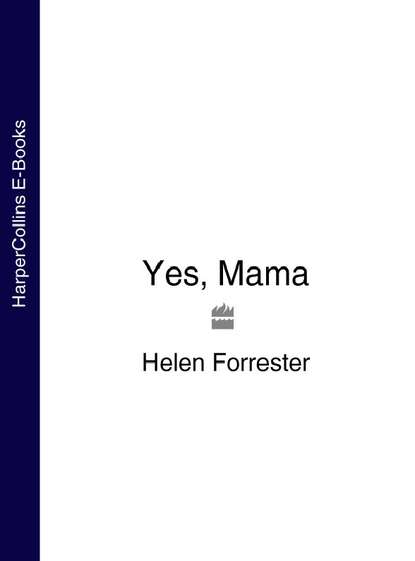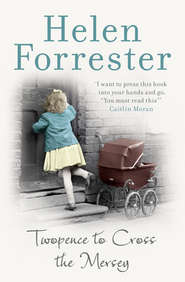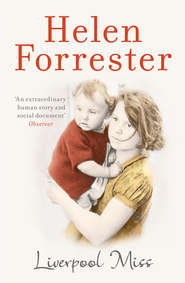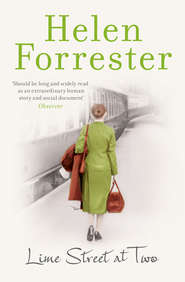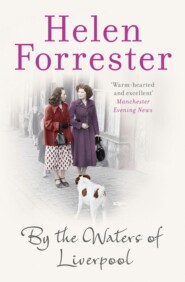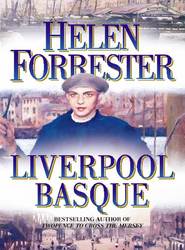По всем вопросам обращайтесь на: info@litportal.ru
(©) 2003-2024.
✖
Yes, Mama
Настройки чтения
Размер шрифта
Высота строк
Поля
Having met Mrs Tibbs, Polly did not have any great hope of these instructions being followed properly. She whispered, however, a faint ‘Thank you, ma’am.’ She allowed herself a small shivering sigh – it had been a long and eventful day for her – and then asked, ‘What’s baby’s name, ma’am?’
‘Alicia Beatrix Mary,’ replied Elizabeth, having decided that it was better to name the child herself, rather than ask Humphrey his opinion. Though she would not have liked to admit it, there was the thought in the back of her mind that, like its baby brother, it might die within the month, anyway; and that would solve a lot of her problems.
Andrew had assured her that since she and Humphrey lived together the child was legally his, unless he repudiated it. Nevertheless, she supposed she would have to go herself to register its birth, as soon as she felt well enough; Humphrey was hardly likely to do anything about putting his name on the birth certificate. She must also write a note to Andrew, she reminded herself, telling him of Alicia’s birth; she could say that she wanted to alter her Will slightly to include a small legacy to the new baby. She sighed, and hoped he would come soon.
‘You may go,’ she told Polly, patiently standing in front of her with the baby in her arms.
III
Unaware of the inconvenience her arrival had caused, Alicia Beatrix Mary was carried up to the attic nurseries. To Polly, the child was sent by the Holy Mother herself to replace the little boy she had lost and to comfort her in her widowhood. For her part, Alicia learned to turn to Polly for mothering; it was Polly’s voice she knew first and Polly’s face that she first recognized.
Chapter Four (#ulink_ac2c70be-2ae9-5ccb-86df-a03da06a1635)
I
Alicia had barely learned how to suck, when Elizabeth, after ten days’ of lying-in, descended one afternoon to the pleasant, sunny morning-room on the ground floor. She was escorted solicitously down the stairs by her friend, Sarah Webb, and was met by her elder daughter, Florence, in the little sitting-room.
As her own confinement drew near, Florence looked white-faced and drawn. She dreaded the birth of her baby, because she had no idea how it would make its way into the world. There did not seem to be an aperture big enough to give it access! She wondered if she would split down the middle, like a pea pod giving up its peas, and the idea terrified her. She was much too afraid of her stout, dogmatic husband, the Reverend Clarence Browning, to ask him. Having been taught nothing about sex and having been horrified when Clarence took her on her honeymoon, she felt that life was vulgar enough, without giving him further opportunity for lewd remarks and disgusting behaviour. She simply did not believe frustrated Clarence’s assurance that their sex life was normal.
She was relieved to see her mother looking very elegant in a copper-coloured gown with the hint of a train at the back and a velvet collar edged with cream lace. It was comforting to realize that her mother had always survived childbirth, despite whatever ordeals it presented.
With the aid of her friend and her elder daughter, Elizabeth was gently eased into an armless easy chair near her work table in the window. Florence had brought a bunch of fat, pink roses from her own garden and had set them in a silver bowl on the table. She had also thoughtfully placed her mother’s workbasket by her chair. Her mother still followed the old custom of making and embroidering her own petticoats and drawers, though Messrs George Henry Lee, a fashionable shop in the town which made her dresses, cloaks and hats, would have been happy to undertake the work for her.
Florence had already been up to the nursery to see Alicia, and now she asked her mother if she had seen the child that day.
Elizabeth was silent for a moment. Then she said heavily, ‘No. Polly will bring her down at teatime.’
‘She is thriving, isn’t she?’
‘I believe so.’
Though Florence had herself been cared for by a nanny, she was worried about the little mite so summarily handed over to a wet-nurse. The baby seemed contented enough, but her mother showed no interest in it; and the nursery, when Flo had visited, appeared neither clean nor tidy. She had spoken sharply to Mrs Tibbs and to Polly about the need for cleanliness. Mrs Tibbs, all indignation, had promised to order the housemaid to turn the room out immediately.
Now, with Sarah Webb nodding agreement, she strove to awaken her mother’s interest in Alicia. ‘Polly needs supervision,’ she told her.
Her mother merely sighed absently, unable to tell her daughter of the sweating fear within her. She asked Florence to serve each of them with a glass of port from the decanter on the sideboard and to hand round biscuits from the biscuit barrel; when her glass was given to her she drank the contents with unmannerly speed.
‘It’s a pity Papa won’t keep a carriage, isn’t it, Mama? Such a lovely afternoon. We could have gone for a drive round the park.’
Elizabeth replied acidly, ‘You know that your father has money for everything – railways, roads, ships, are all he’s interested in. Never thinks of my needs.’
Sarah Webb, anxious to cheer up her friend, broke in, ‘Dear Elizabeth, if you don’t mind being driven in a governess cart, I should be delighted to take you out. I stabled it in Crown Street during your confinement, so that I would have it close by. As you know, I can handle the reins quite well.’
The idea of being seen in her old friend’s extremely shabby, humble vehicle, made Elizabeth shudder.
‘No, no, Sarah, thank you. If I wished, I could, I suppose, hire a carriage from the stables. Thanks to my own dear Papa, I am not without funds for such things. And Andrew has managed my portion so well that it has increased.’
Elizabeth’s dowry, legally tied up so that Humphrey could not touch it, provided her with a good wardrobe and sufficient pin money for small luxuries, like a hired carriage to take her shopping. But if Humphrey was so mean that he would not provide her with a fashionable vehicle, she preferred to put him in the wrong by being a martyr among her better-equipped friends. So, while Sarah and Florence sought to raise her spirits, she sighed and sulked, and looked forward with absolute dread to her husband’s return from his office in the city.
She had not seen Humphrey since the night of Alicia’s birth. As he had done for the past year, he had slept in the dressing-room next to their bedroom; in addition to the entrance to the bedroom, it had a door leading on to the landing, so he came and went without entering her room. Today, unless she feigned fatigue and returned to her bed, she would have to meet him at dinner. Later in the afternoon, Sarah and Florence would both go home and there would be no one present to make it necessary for him to control himself. The prospect made her feel sick, and she wondered what Andrew would do, if she ordered a carriage and fled to him.
As she drank her second glass of port and listened to Sarah and Florence talking about the joys of motherhood, she wanted to cry. Where was Andrew? He could have called or, at least, have sent some flowers from his wife and himself. He was her lawyer. He had every right to call on her. But in her heart she knew Andrew. He was in many ways weak; he would avoid a troublesome mistress as if she had the plague.
‘Babies are such darlings,’ gushed Sarah, none of whose nephews and nieces had ever been presented to her by their nannies, unless dry, fed and sleepy. She herself would not have known what to do with a sopping wet, hungry, howling infant, except to coo over it.
Florence was smart enough to realize this. She remembered her younger brother, Charles, with whom she had shared the nursery for a while; he had been anything but lovely. Clarence had told her flatly that they could not afford a nurse for their baby and that she must do the best she could with the aid of their cook – general and kitchen – maid. Because Charles was a boy, she had never seen him either bathed or changed. How did you change a small, wriggling creature like a baby? Or bathe it? Or put it to the breast? She hoped, rather frantically, that Mrs Macdonald, the midwife, would instruct her; she could not ask such vulgar questions of Mama. In some despair, she had made a point of arriving at her mother’s house quite early, during the past ten days, having taken the horse-bus from home, so that she could go upstairs to watch Polly struggling with Alicia.
II
Polly was herself learning on the job, though she knew much more about birth and babies than poor Florence did. Before coming to the Woodman household, she had received some strict advice from her mother and from her Great-aunt Kitty, herself a midwife to the slum women around her. The result was that, much as she protested, Alicia was scoured twice daily from head to heel. To Fanny’s irritation, the child was changed the moment she was damp; it was poor Fanny who had to carry the pails of dirty napkins, petticoats and gowns down to the cellar ready for the washerwoman.
‘All for nought but a little bastard,’ Fanny had muttered, as she heaved the heavy pails down the stairs.
To the Woodmans, Fanny was nothing but a quiet, little shadow responsible for all the coal fires in the house. As she went from room to room, she had become well aware of Andrew Crossing’s interest in her mistress; raucous jokes at his expense had been a real source of entertainment on quiet evenings in the kitchen, as the maids sipped their fender ale.
Fanny had also seen something of the bitter fights between Elizabeth and Humphrey. When she went through the house to make up all the fires and they heard her knock, they would stop their shouting and upbraiding and would stand rigidly staring at each other while she poked up the fire and added more coal; as soon as she was out of the door, coal hod in hand, she would hear them renew the battle.
It was Fanny who danced out into the street to find a cab to take Florence home. She took her time because it was so lovely to be out in the afternoon sun, and, when she found one, Florence gave her twopence for her trouble.
Florence was thankful that her mother had insisted on giving her the money to pay for the cab; otherwise, she would have had to take the horse-bus again. Though Elizabeth had great faith that the Reverend Clarence Browning would make his way upwards in the Church and would, in due course, be able to afford a carriage, Florence was acutely aware that he was far too outspoken, far too direct, ever to be recommended for high office. Florence herself was content to preside over the little vicarage they occupied, thankful that a man so intent on the saving of souls had managed, in spite of church politics, to rise to a vicarage. She asked no more – except for a nanny.
In order to conserve her strength for the coming confrontation with Humphrey, Elizabeth tried to take a nap in the afternoon, but she was so filled with anxiety that she returned to the morning-room in time to take tea and to receive Polly and Alicia.
Alicia was hungry and was screaming. Elizabeth inquired of Polly if she had everything she needed for the child and then sent her thankfully back upstairs.
III
When Humphrey bowled swiftly into the dining-room for dinner, his white-faced wife was already seated, and Maisie, the parlourmaid, was hovering over the laden sideboard.
Humphrey ignored both of them. He indicated that he was ready to be served by simply shaking out his table napkin and spreading it across his stomach. In complete silence, Maisie served them both.
Never a man to waste anything, Humphrey ate his way stolidly through soup, roast beef and steamed pudding. He knew, as his wife had already sensed, that this was the evening to make clear his attitude towards Alicia, who, like his wife, he had hoped would either miscarry or be born dead.
Impotent rage surged through him. Hemmed in by the constrictions of social propriety, he was certain there was not a great deal he could do about the situation without coming to grief himself, and this knowledge added to his boiling anger. He helped himself to hot mustard and cursed under his breath when the condiment stuck to its spoon. He banged the tiny spoon on the side of his plate and in the tensely quiet room it sounded like a pistol going off.
Elizabeth kept her eyes down and picked uneasily at her food. Her mind leaped wildly between fear of Humphrey and heartbreak that she had not heard from Andrew.
She jumped when Humphrey asked for a second helping of pudding and more wine. Really, the man ate like a hog. The only thing he seemed to notice in the house was when Mrs Tibbs’ cooking was not up to its usual standard.
Humphrey had, indeed, not noticed for months that his wife was pregnant. When he did, he had hastily checked his office diary. It told him with certainty that the child could not be his. Plump, comfortable Mrs Jakes kept him so exhausted that he had rarely slept with his wife. Elizabeth had not seemed to care about his neglect.
Elizabeth had been more than thankful to be relieved of her wifely duties. Her lifelong friend, Andrew Crossing, had been only too willing to meet her needs, since his wife was a useless invalid. As Maisie took away her untouched roast beef, she thought agonizedly of how she had rebelled against marrying Humphrey, how passionately she had loved her childhood playmate, Andrew. At nineteen, Andrew had had no money and had failed his first year at University; her father had been adamant that he was not suitable for her. In contrast, at twenty-five, Humphrey was already well-established with his father, in a brokerage business and, as the elder son, he was to inherit the entire enterprise. What her father had not realized, Elizabeth fulminated, was that Humphrey was not only physically repellent to her, but also had the hoarding instincts of a jackdaw; his ambition was to accumulate capital to invest in shipping or railways. He lectured her regularly, from the days of their unhappy honeymoon onwards, on the fact that capital accumulated by personal savings was the only sure way to expand a business. Money made in a business should be ploughed back in. He had rationed her and, later, poor Flo, to two pairs of black woollen stockings and one pair of white silk every winter of her married life; any extra ones had had to be bought out of the money left her by her father. And he still went over Mrs Tibbs’ account books with her each month and railed at her for waste.
It had taken twelve months of unmitigated pressure by her parents to make her marry him, twelve months during which no other young man had been allowed to get more than a single dance with her and she was never left alone.
It was Andrew himself who finally had broken her resolve.
At a banquet and ball given by the Mayor, Mr Gardner, to celebrate the marriage of the Prince of Wales to Princess Alexandra of Denmark, he had pushed his way through the throng, to find her sitting demurely beside her mother and her aunt, while her bearded father and his brother had gone to join their friends for a drink. He had formally asked for a waltz.





